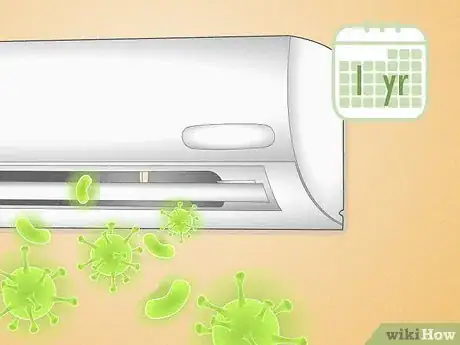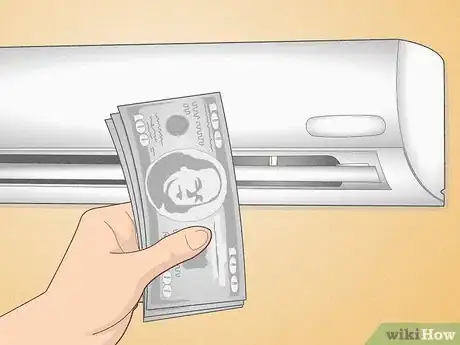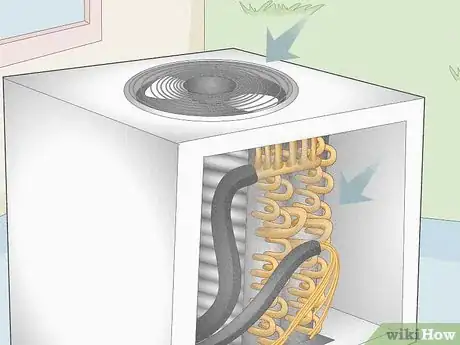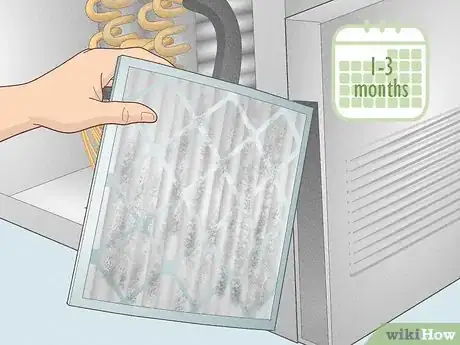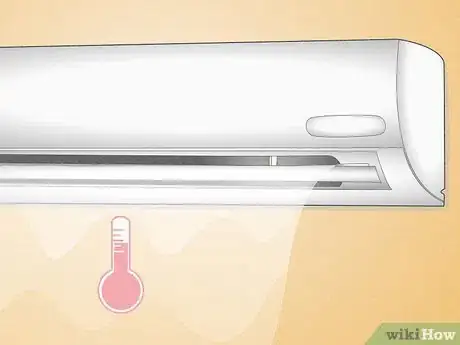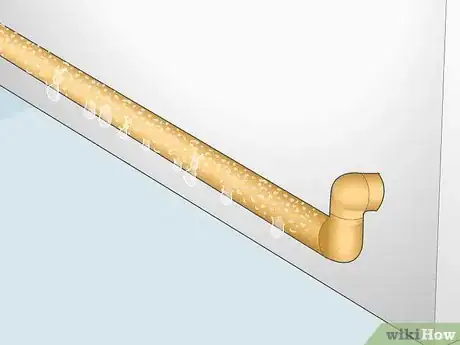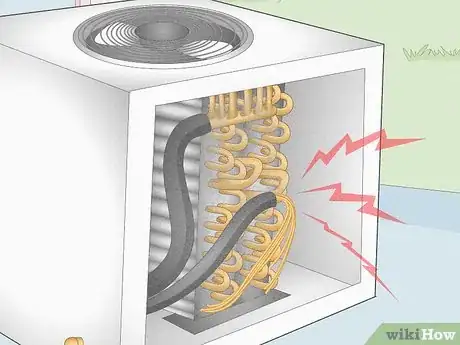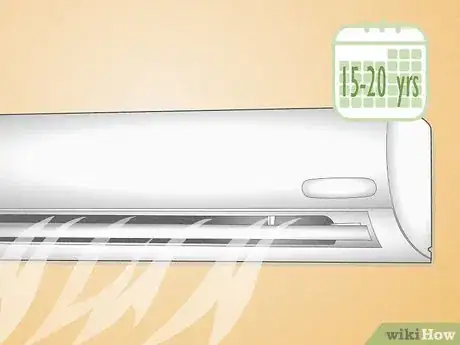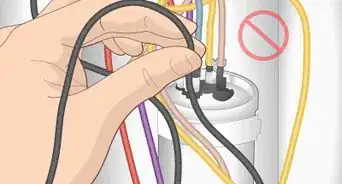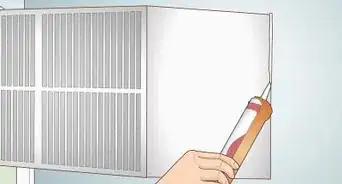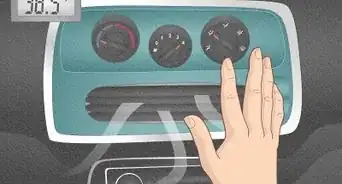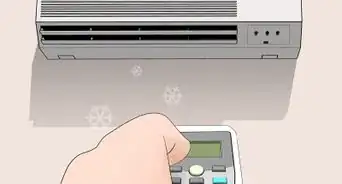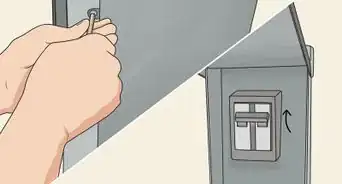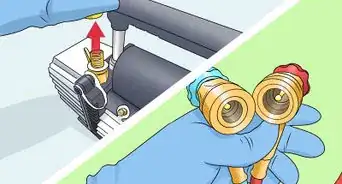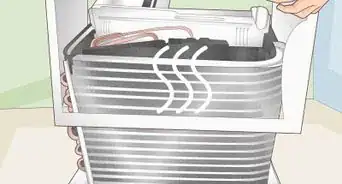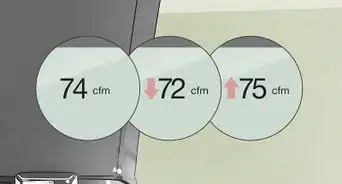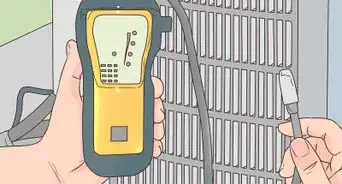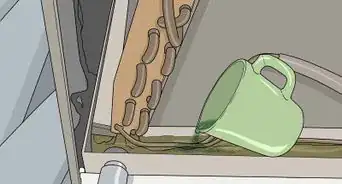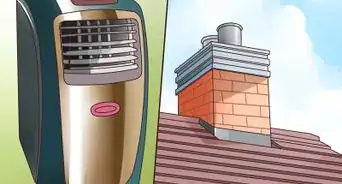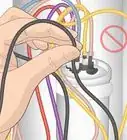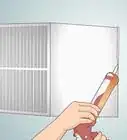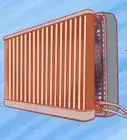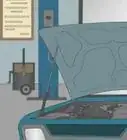This article was co-authored by Victor Belavus and by wikiHow staff writer, Eric McClure. Victor Belavus is an Air Conditioning Specialist and the Owner of 212 HVAC, an air condition repair and installation company based in Brooklyn, New York. In addition to HVAC and air conditioning units, Victor also specializes in furnace repair and air duct cleaning. He has over 10 years of experience working with HVAC systems.
There are 12 references cited in this article, which can be found at the bottom of the page.
wikiHow marks an article as reader-approved once it receives enough positive feedback. In this case, 89% of readers who voted found the article helpful, earning it our reader-approved status.
This article has been viewed 182,544 times.
The same way your vehicle requires a regular oil change, your AC system requires an annual service call. AC servicing typically refers to the process of getting an HVAC technician out for an annual inspection and maintenance work, but you may be able to save a few dollars if you do all of the cleaning yourself. With that said, you won’t be able to diagnose any deeper problems without the eye of a qualified technician, so you really do need to get a regular checkup to keep things cool around your home.
Steps
What is included in AC servicing?
-
1They’ll clean the interior, fans, and coils out to keep them spotless. A clean fan, case, and coils is essential for healthy, cool air. They’ll clean your AC unit thoroughly to keep debris and bacteria from building up inside of your unit. They may also adjust your fan if it’s a little imbalanced to make sure that your home stays properly and efficiently chilled during the summer months.[4]
-
2Service calls will also include refrigerant, airflow, and leak checks. A typical service call will also involve a refrigerant check to make sure that your AC system is adequately filled. They’ll also assess the blower components to make sure the air is blowing out efficiently, and check your unit for any kinds of leaks or corrosion. They should be able to fix those problems for you on the spot.[5]
- For electrical issues, a service technician may use a multimeter to test the electrical components in the compressor.[6]
What kind of service can I do on my own?
-
1Replace the filter every 1-3 months depending on how often it’s running. If your AC system is acting up, replacing the filter may solve the issue. A dirty filter can lead to a variety of problems, and if replacing the filter fixes whatever issue you have, you probably don’t need to call a pro. Even if the AC is running just fine, make sure you replace it regularly to keep it running efficiently.[7]
- In central air systems, the filters are typically located in the return ducts on walls or ceilings. Room and window units usually have a filter behind the grill on the front of the unit. Split systems usually have a reusable filter in a panel on the compressor.[8]
-
2You can clean the system yourself to save a few dollars if you’d like. Cleaning a central, split, or window AC unit on your own will keep it running efficiently. While a service technician will do this for you on a service call, doing it yourself may save you some money.[9]
- You may be able to clean the inside of your AC system depending on how comfortable you are opening your AC unit up, but you won’t be able to spot any serious issues without a service technician.[10]
- Any service work involving leaks, electrical problems, fan issues, or blower components will require a pro. These aren’t reasonable DIY tasks.[11]
How do I know if my air conditioner needs to be serviced?
-
1Warm air, leaks, and inconsistent air flow all merit a call. You should get a yearly service call regardless of whether your AC system is working correctly or not. However, if your AC is blowing out warm air, leaking refrigerant, or it seems to struggle blowing out air at all, contact an HVAC technician to have them take a look as soon as you can.[12]EXPERT TIPVictor Belavus is an Air Conditioning Specialist and the Owner of 212 HVAC, an air condition repair and installation company based in Brooklyn, New York. In addition to HVAC and air conditioning units, Victor also specializes in furnace repair and air duct cleaning. He has over 10 years of experience working with HVAC systems.Air Conditioning Specialist

 Victor Belavus
Victor Belavus
Air Conditioning SpecialistSchedule your yearly service in the spring, before you start using it for the year. You should also inspect your air conditioner regularly for signs of mold or debris - if these are present, it's time for a service, even if a full year has not gone passed.
-
2Electrical problems also deserve a service call. If the AC system turns on and off when it shouldn’t, or the power cuts out randomly, get a technician to take a look. While you may be tempted to open your AC unit up and start toying with wires, it’s not particularly safe to do this and you may make the problem worse. Just have a pro take a look.[13]
How do I know if my AC compressor is bad?
-
1Strange noises, leaks, and airflow disruption are common signs. A dying AC compressor can cause a variety of issues. However, there’s no way for you to confirm it without getting a pro to take a look. They’ll be able to test the leads and terminals inside of the compressor with a multimeter to determine if the compressor is actually dying.[15]
-
2Try resetting the compressor if it shuts off randomly. If your AC system shuts down randomly and you’re suspecting a compressor problem, flip the circuit breakers, wait 5 minutes, and try flipping them back on to see if that helps. If it doesn’t, follow your AC unit’s instruction manual to find the high-pressure limit switch, which is usually located on the compressor’s access panel. Flip that to see if your problem goes away.[16]
- If this doesn’t do the trick, it’s definitely time to call a professional.
What is the average life of an air conditioner?
-
1Most window units need to be replaced after 8-10 years. Window units aren’t the most durable of all time, but you should be able to get at least a decade out of it. If it’s more expensive to repair than it is to buy a new one, just replace it.[17]
-
2Central air systems should last 12-17 years. After 12-17 years have passed, the compressor may need to be replaced, or your system may need to be upgraded. You may be able to prolong a central air system’s lifespan by replacing the filter regularly, though.[18]
-
3Ductless split systems usually last 15-20 years. One of the major benefits of a ductless split system is that they tend to last a long time. If you take care of it, a split system should last at least two decades before it needs replacing.[19]
Expert Q&A
Did you know you can get premium answers for this article?
Unlock premium answers by supporting wikiHow
-
QuestionHow do I know if my evaporator coil needs cleaning?
 Victor BelavusVictor Belavus is an Air Conditioning Specialist and the Owner of 212 HVAC, an air condition repair and installation company based in Brooklyn, New York. In addition to HVAC and air conditioning units, Victor also specializes in furnace repair and air duct cleaning. He has over 10 years of experience working with HVAC systems.
Victor BelavusVictor Belavus is an Air Conditioning Specialist and the Owner of 212 HVAC, an air condition repair and installation company based in Brooklyn, New York. In addition to HVAC and air conditioning units, Victor also specializes in furnace repair and air duct cleaning. He has over 10 years of experience working with HVAC systems.
Air Conditioning Specialist
-
QuestionHow do you troubleshoot a condensate pump?
 Victor BelavusVictor Belavus is an Air Conditioning Specialist and the Owner of 212 HVAC, an air condition repair and installation company based in Brooklyn, New York. In addition to HVAC and air conditioning units, Victor also specializes in furnace repair and air duct cleaning. He has over 10 years of experience working with HVAC systems.
Victor BelavusVictor Belavus is an Air Conditioning Specialist and the Owner of 212 HVAC, an air condition repair and installation company based in Brooklyn, New York. In addition to HVAC and air conditioning units, Victor also specializes in furnace repair and air duct cleaning. He has over 10 years of experience working with HVAC systems.
Air Conditioning Specialist
-
QuestionHow often should I get my air conditioner serviced professionally?
 Victor BelavusVictor Belavus is an Air Conditioning Specialist and the Owner of 212 HVAC, an air condition repair and installation company based in Brooklyn, New York. In addition to HVAC and air conditioning units, Victor also specializes in furnace repair and air duct cleaning. He has over 10 years of experience working with HVAC systems.
Victor BelavusVictor Belavus is an Air Conditioning Specialist and the Owner of 212 HVAC, an air condition repair and installation company based in Brooklyn, New York. In addition to HVAC and air conditioning units, Victor also specializes in furnace repair and air duct cleaning. He has over 10 years of experience working with HVAC systems.
Air Conditioning Specialist
References
- ↑ https://time.com/4408512/air-conditioning-mistakes/
- ↑ https://www.thumbtack.com/p/ac-service-cost
- ↑ https://www.energystar.gov/campaign/heating_cooling/maintenance_checklist
- ↑ https://www.pickhvac.com/central-air-conditioner/tune-up/
- ↑ https://www.energy.gov/energysaver/common-air-conditioner-problems
- ↑ https://www.achrnews.com/articles/136798-troubleshooting-a-faulty-hvac-compressor-requires-patience
- ↑ https://time.com/4408512/air-conditioning-mistakes/
- ↑ https://www.bobvila.com/slideshow/11-air-conditioning-mistakes-that-spike-your-bills-51293
- ↑ https://www.energy.gov/energysaver/maintaining-your-air-conditioner
- ↑ https://www.energy.gov/energysaver/maintaining-your-air-conditioner
- ↑ https://www.energy.gov/energysaver/maintaining-your-air-conditioner
- ↑ https://www.energy.gov/energysaver/common-air-conditioner-problems
- ↑ https://www.energy.gov/energysaver/common-air-conditioner-problems
- ↑ https://youtu.be/beVRELr8Oak?t=37
- ↑ https://www.achrnews.com/articles/136798-troubleshooting-a-faulty-hvac-compressor-requires-patience
- ↑ https://www.energy.gov/energysaver/common-air-conditioner-problems
- ↑ https://www.consumerreports.org/window-air-conditioners/when-to-get-a-new-window-air-conditioner/
- ↑ https://www.bobvila.com/articles/how-long-does-an-air-conditioner-last/
- ↑ https://www.thisoldhouse.com/heating-cooling/21018989/read-this-before-you-buy-ductless-ac
About This Article
Before you service an air conditioner, make sure the unit is turned completely off by unplugging or shutting off the circuit breaker. Then, rake off any debris from the unit and use a soft brush to remove dirt from the outside cover. If the small copper pipe connecting the unit to the house feels hot, the unit’s coils likely needs to be washed. Remove the outside cover, cover the motor and wiring with a plastic sheet, and hose down the fins, coils, and inside of the unit. Finally, replace the cover when you’re done. For more tips, including how to fix pooling water issues, read on!
